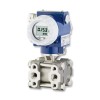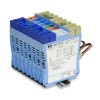Total accumulated quantity of substance transferred.
A totalizer is a measurement feature included with some types of meters which stores or maintains a record of the accumulated quantity of some substance over time.
Totalizers can be reset to start at a particular point in time or after a certain amount has been completed. For example a totalizer can be used to determine the total quantity accumulated, which can then be used to calculate the cost of oil that has been delivered along a pipeline, or ensure the correct percentage of dose is added to a food mixing process.
Glossary of Measurement Signal technical terms
- 2 Wire
- 3 Wire
- 4 to 20 mA Current Loop Output Signal
- 4 Wire
- Amplified Voltage Output
- BFSG – Bonded Foil Strain Gauge
- Deadband
- FSO – Full Scale Output
- HART®
- mV/V – Millivolts per Volt Output Signal
- NC – Normally Closed
- NO – Normally Open
- Piezoresistive Strain Gauges
- Ratiometric
- Span
- Span Offset
- Span Sensitivity
- Square Root Extraction
- Threshold
- Transducer
- Transmitter
- TSL – Terminal Straight Line
- TSS – Thermal Span or Sensitivity Shift
- Turndown Ratio
- USB
- Vented Cable
- Wheatstone Bridge Strain Gauge
- Zero Offset
- Zero Tare
Help from Measurement Signal resources
- Supply voltage and load resistance considerations for pressure transmitters
- What can cause random variation in pressure transducer output
- What is the difference between zero offset and zero drift?
- Why use 4-20mA and 3-15 psi rather than 0-20mA & 0-15psi




